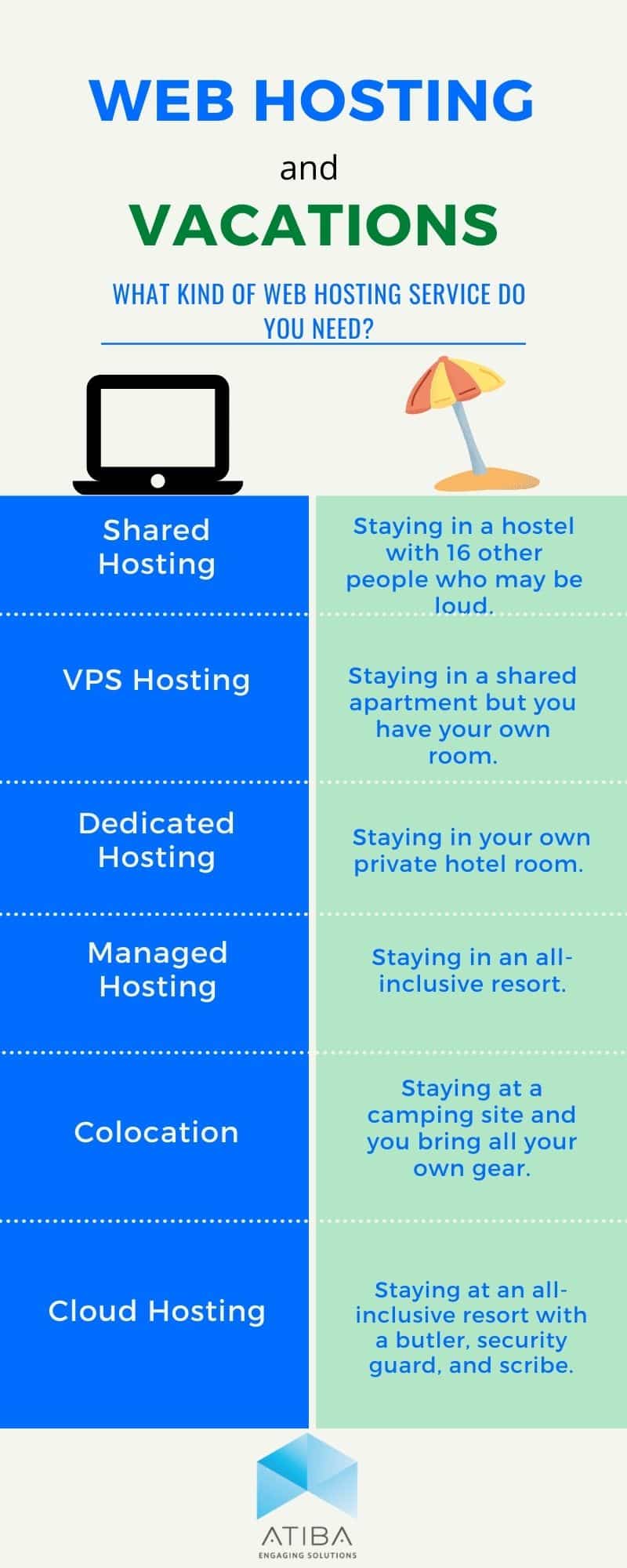When making a website, we often focus on the look, feel, images, and content. There are definitely web design guidelines you want to follow when planning your website. But there are also plenty of behind-the-scenes tasks that need your attention.
One of those tasks is web hosting. Finding a web hosting service can be tricky for businesses and individuals launching websites because there are many factors to consider. Web hosting is a key, but often overlooked, part of having a successful website.
Today, we’re going to be talking about web hosting, how it works, and how you can go about choosing a web hosting service.
What is Web Hosting?
Web hosting is a type of service that allows anyone from multinational corporations to kids in a computer class to put a website or web page on the internet. When a website has a web host, visitors can view that page on the internet. When someone types in your website address in their browser, their computer connects them to a web server which sends the website back to their browser.
Web hosting services are provided by web hosting companies. A quick Google search will bring up endless options to host your website. Some of the most popular are GoDaddy, HostGator, and WPEngine.
What Features Come with Web Hosting?

Besides having your website visible on the web, web hosting companies can provide you with several other services, such as:
- Support and troubleshooting. If your website goes down, then your web hosting company should be your first point of contact.
- FTP access. This allows you to upload files, such as media, to your website from a computer.
- Email hosting. For your company or business to look professional, it’s always better to have your email for your domain name instead of a basic Gmail or Yahoo account.
- SSL Certificate. Some hosting companies will provide you with an SSL to keep your website secure.
- Domain registration. This isn’t always the case, but some hosting companies will also register your domain name.
Speaking of domains…
Web Hosting vs. Domain Hosting
Although these two are closely related, they’re different services.
A web host provides an area for you to put your web content like images, videos, downloads, and more. A web host may or may not give you your domain name, like awesomewebsite.com.
A domain host, on the other hand, gives you your domain name for your website.
Some companies have their domain and web hosting with the same provider while others do not. Many companies prefer to have it all under one roof to keep everything neatly organized.
How Much Does Web Hosting Cost?
Web hosting can be as little as $2.50 a month all the way up to $800 a month. Just like many other things in the tech world, you get what you pay for.
With cheap web hosting, you’re likely to see little customer service, limited maintenance, and slow website speeds. Going for a more expensive option may give you your own server, regular maintenance, and more.
The price range is so broad because of web hosting features and business choices. Things like:
- Business size
- Website goals
- Type of hosting
- Hosting plan
- Other features you may need (domain name, SSL certificate, etc.)
The type of hosting is the most important factor. Let’s run through some of the most common types of web hosting options.
The Different Types of Web Hosting

Shared Hosting
The cheapest web hosting option available, shared web hosting is when multiple websites are hosted on the same server. You do save money but also have to share web resources with other websites.
That means that your website’s bandwidth and storage may be limited due to the other websites present on the server.
If you’re sharing your server with other small websites, it may not be that big of a deal. But if one of the other websites starts receiving a high uptick in traffic and users, your website could suffer.
VPS Hosting
VPS, or virtual private server, is the middle ground between shared and dedicated hosting.
While your website will still share a server, it will share a server with far fewer websites. You won’t be sharing as many resources with other websites and a ‘neighbor’ receiving large amounts of traffic won’t affect your site as much.
Dedicated Server Hosting
The exact opposite to shared hosting, dedicated server hosting gives you your own server. You won’t be sharing space or resources with anyone and you get full, complete control over everything. That means more customization and options for your business.
This is the better option for websites with high traffic or eCommerce sites that don’t want to risk web performance.
The biggest downside to dedicated server hosting is it requires more maintenance and upkeep than shared hosting. It’s also one of the more expensive options on this list.
Managed Hosting
Often the preferred plan for many businesses, managed hosting comes from a managed services provider (MSP). The MSP will get you set up with hosting, run routine maintenance, and be in control of the server.
Both small and large businesses can make use of managed hosting as they often come with some additional features, such as:
- Hardware setup
- Security
- Backup recovery
- Customer support
- Disaster recovery
Since you have a dedicated team managing your server, you won’t have to worry about the day-to-day. You can focus on your business while your MSP takes control of the geek stuff.
Colocation
The mix-and-match option, colocation is when you provide your own personal servers and equipment and place them in a colocation center.
The center will take care of things like electricity, maintenance, cooling, and more.
This option requires a high level of expertise and may not be the best option for small businesses or individuals.
Cloud Hosting
The cloud in general has seen a huge popularity boom over the last few years. Cloud hosting and computing are part of this new wave of excitement and use.
Cloud hosting is a little different than other hosting options in that you rent part of a data center. By doing so, you receive access to multiple servers and resources. Your website can survive a surge in traffic more easily.
Because of this, your website won’t be affected if one server were to go down. Cloud hosting is also more secure, provides higher uptime, is more scalable, and gives you access to the latest technology. In short, cloud hosting is (usually) the best option.
So why isn’t everyone switching to the cloud?
Unfortunately, it’s a bit more expensive than other options. It also may not be the best option for small websites with limited reach.
Cloud hosting doesn’t offer the same amount of customization options that other hosting services provide. Backing up your data can become more expensive as well.

How Do I Choose a Web Hosting Company?
Think About Your Business Goals and Website Needs
What is your business hoping to do in the next year? Three years? Five years? Do you want to grow and add an eCommerce store? What does your online traffic look like?
Are you a small business just wanting to have an online presence? Do you have a tech expert on hand or do you need someone to manage your server?
By figuring out your business goals and website needs, you can find a web hosting company that’s right for you. Take a look at the tools and features the company offers and see if they make sense for you. You don’t want to be wasting money on features you won’t ever use.
Research Features
If your website sees heavy traffic regularly, then you’re going to want to find a company that provides regular maintenance and upkeep. The last thing you want to happen is for your website to go down during peak hours.
Think about features you’d like to have as well, like:
- Customization
- Customer support
- Bundles or packages
- Other technical needs
What would make sense for you to use?
Past Performance
Ask the web hosting company about their past performance. Look at things like uptime, storage, backup schedules, security, and more.
Choosing a web host isn’t a weekly activity. You want to make sure you’re sticking with one that will be with you for the long run.
Web Hosting Services with Atiba
Here at Atiba, we provide web hosting services for businesses of all sizes. We’ve been providing hosting options for companies for over two decades and our experienced network services team can help you set up and maintain your website. Reach out and get in contact with us today!
